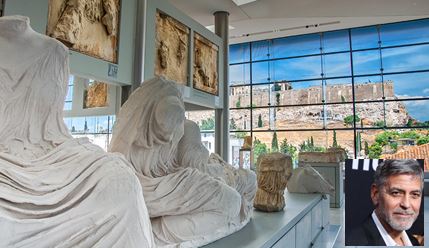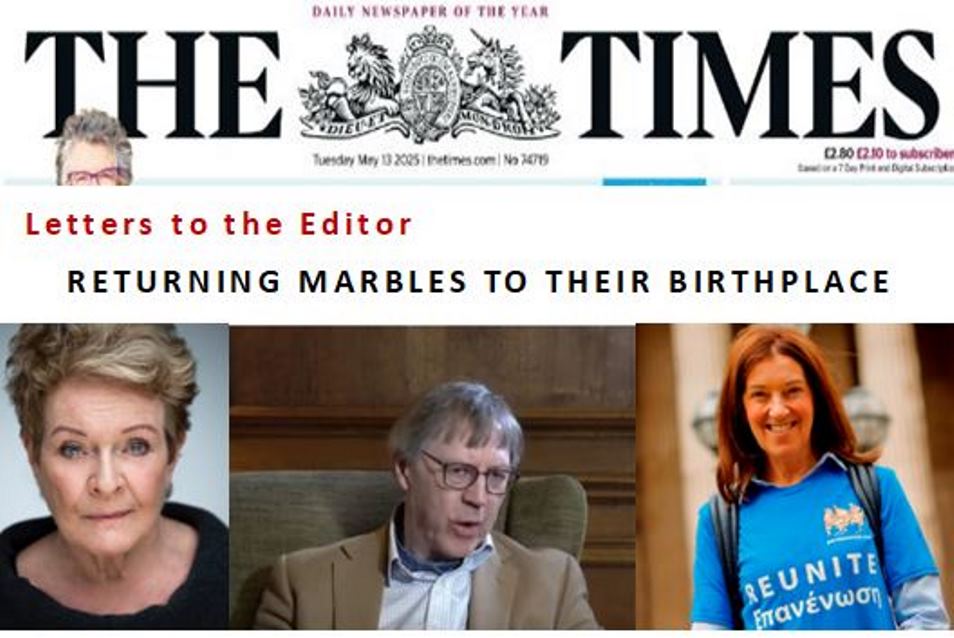Author: Trevor Timpson BBC News online
05 January 2010
Greek calls for the UK to return the Parthenon Marbles, nearly 200 years after they were removed from the Acropolis and shipped to London, have a new advocate leading the battle in the UK.
Former MP Eddie O'Hara, the new chairman of the British Committee for the Reunification of the Parthenon Marbles (BCRPM), has told the BBC News website he is optimistic the campaign for the British Museum to return the sculptures, also known as the Elgin Marbles, will succeed.
However a spokesman for the Department for Culture, Media and Sport said government policy remained unchanged, and that there were no plans to return the Marbles to Greece.
As a Labour MP from 1990 to 2010, Mr O'Hara was the "anchor man" for the BCRPM in Parliament.
"We did have a number of more or less fruitful meetings with ministers," he says. "Certainly under the Labour government there were a number of ministers who were hugely sympathetic."
But he was never able to get past the "Keepers of the Gate" - civil servants advising the ministers - says Mr O'Hara.
He believes things may have been different if Neil Kinnock had become prime minister in 1992. "That would probably have been the best chance that we had," he says, because the Labour leader was known to be strongly in favour of returning the Marbles.
On the spot
The 1997 Labour government's speedy announcement that the Marbles would not be returned was "a catastrophe", says Mr O'Hara.
He believes members of the incoming government were doorstepped by Greek journalists and put on the spot too quickly, making it impossible for them to overturn the existing departmental line.
"That set us back," says Mr O'Hara. He told Tony Blair that sending back the Marbles would "redound tremendously to the UK's credit" but failed to convince the prime minister who went on to serve for 10 years.
He adds: "Tony Blair had many strengths and many interests but I don't think the Marbles was one one of them."
And as for Gordon Brown? "I doubt if it crossed his radar," is Mr O'Hara's view.
Now out of Parliament, but convinced that public opinion is moving constantly in his favour, Eddie O'Hara, 73, believes the British Museum has few arguments left to defend its retention of the Marbles.
"The BM Trustees shelter behind the argument that it is the law - that they are entrusted with these artefacts and cannot divest themselves of them," he says. "But the government simply needs to legislate to say 'yes, this is possible'."
Greece stepped up the heat two years ago with the opening of the new Acropolis Museum, which includes a space for all the surviving Acropolis sculptures to be displayed in their original order, with the Parthenon temple clearly visible through the gallery's glass walls.
"There's only one place on earth where you can have a simultaneous visual and aesthetic experience of the Parthenon and the sculptures, and that's in that gallery," says Mr O'Hara.
Eddie O'Hara rejects argument that sending the sculptures back would "open the floodgates" and lead to large numbers of exhibits being returned from world-famous museums to their places of origin.
Instead, he believes the Marbles present a unique case: "There really aren't a lot of examples of Unesco world heritage monuments, integral components of which are in the wrong place."
Nor does Mr O'Hara accept the newer argument, advanced particularly by British Museum director Neil MacGregor, that his is a "universal" museum in which exhibits such as the Marbles are part of a wider narrative of civilisation.
"The British Museum can situate the achievements of these Greek sculptures in the context of the wider world," Mr Macgregor has said.
But Eddie O'Hara counters: "It does seem to me a bit rich that the Marbles should be made to serve the purpose of exemplars in a narrative which is an artificial construct.
"There's a narrative that has a stronger claim to these artefacts - It's the narrative of the Parthenon, which is told in the new Acropolis Museum."
The attitude of the government will be decisive in the end, Mr O'Hara believes.
The British Museum's Parthenon Marbles are among its best-known exhibits.
The Greek and UK governments are both overwhelmed with economic problems at present, he believes. But when the waters become less choppy, he is hopeful that progress can be made.
David Cameron, Mr O'Hara says, has a "sharp eye for a public relations opportunity". And Nick Clegg is on record as backing the return of the Marbles. He is also optimistic that with a future Labour government "we can push the case".
The Department for Culture, Media and Sport said the previous government's position was that the Marbles would not be returned to Greece, and the current coalition government feels the same way.
A department spokesman said what happens to the sculptures was a matter for the British Museum trustees, who operate independently of the government and are free from political interference.
He added that under the museum's governing statute (the British Museum Act, 1963 - a law which the government has no plans to change) the trustees are prevented from giving away objects unless they are duplicates or unfit for keeping.
However Mr O'Hara is pressing ahead with plans to call a meeting of the BCRPM, and among the topics to be discussed will be new methods of communication. The role of petitions on the government website will be a "very important" topic, he says.
What about the "Keepers of the Gate"? Well, says Mr O'Hara, if they are civil servants in the culture department, they have to be sensitive to what is going on culturally - and public opinion on many fronts (if people are aware) says 'Yes, of course they should go back'."
As far as the British Museum trustees are concerned, "They are defending a case which we regard as very difficult to defend - and we should make them defend it."
The Parthenon Marbles
• Friezes and pediment figures which decorated the Parthenon temple in Athens, built 447-432 BC.
• Many were removed by agents of the British diplomat Lord Elgin in the early 19th century, and eventually sold to the British Museum.
• Most of the surviving sculptures are roughly equally divided between London and Athens.
• Greece has repeatedly demanded that the British Museum marbles be returned to Athens.
• The British Committee for the Reunification of the Parthenon Marbles, formed in 1983, supports the Greek demand.
• Athens' new Acropolis Museum opened in 2009. It is designed to display all the surviving sculptures, in their original layout.





Comments powered by CComment